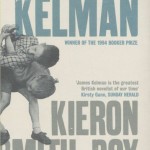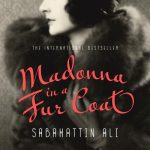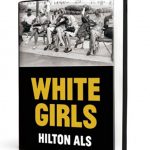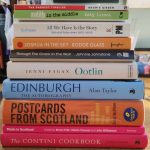Emma Brankin is a writer and educator from Glasgow. Her new collection of short stories, Attention Seekers, has just been published
Support independent, non-corporate media.
Donate here!
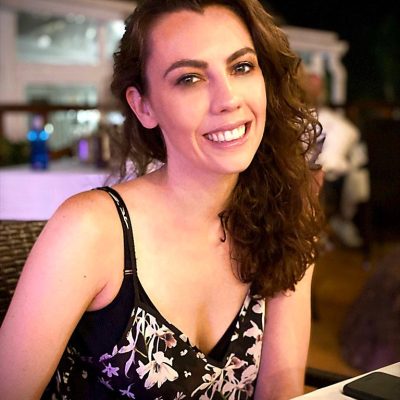
What was your first story published and how did it feel to have achieved that?
My first story ever published was with Product! It was a story written in the early days of my Creative Writing Masters called In The Water. I was going for a dark, magical realism vibe. In all honesty, although I was absolutely thrilled and delighted to be published, I don’t think the story is reflective nowadays of who I am as a writer. I was trying very hard to write like authors I admired and I think I am a much more truthful writer when I just write like myself.
Can you tell us one of the most surprising things you learned in creating your book?
What has been a lovely surprise has been discovering how supportive some other authors – sometimes complete strangers – have been in offering their advice. If I am ever in the position to show kindness to an author in a future, I know I will certainly be remembering the example fabulous writers such as Alex Howard, Heather Darwent, Tom Vowler and so much more have set.
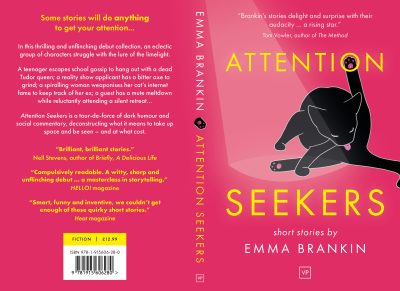
What inspired you to write about attention seekers and their every-day struggles?
From a young age, I have always been interested in the most overt form of attention seeking – the acting world! I was fascinated with the Oscars and my guilty pleasure is listening to a podcast called The C Word which charts the rise and fall of a very diverse mix of fabulously complicated famous women. Personally, I think it’s more interesting to look at the people on the periphery of fame or attention e.g the daughter of a Harvey Weinstein type or the fed-up journalist at a movie premiere or the owner of a cat that’s famous on Instagram. I don’t want to hear the thoughts and feelings of a tabloid starlet but I do want to hear the thoughts and feelings of the vagina of a tabloid starlet. And attention can be so many things – a drug, a gift, a curse, a shaming, an ambition… It just seemed to me that, naturally, quite a lot of the stories I was getting published fit this theme.
Is there anything you know now about your career that you wish you knew when you started out?
I do absolutely champion the mantra that you should write for yourself… because if you’re truthful to your voice, readers should hopefully appreciate and be energized by that truth. But I also equally do think, if publication is important to you, that you should be reading as much as possible – and really understanding the key elements that most successful stories possess. So, I think I wish I’d known more about how to balance those two things when I started out.
If you could steal a painting from anywhere in the world to hang above your writing desk, which would it be?
A story in my collection is called Anita Berber Takes Her Clothes Off Again which is inspired by the life of a Berlin cabaret icon. It mentions a painting called Portrait of the Dancer Anita Berber by Otto Dix which I find fascinating. I would absolutely love to have that painting in my possession – although it’s so provocative and challenging, it might end up being a distraction from my writing.
When you approach your desk in the morning, do you ever find yourself wanting to run screaming in the opposite direction? If so, how do you get yourself to sit down and start writing?
I don’t ever want to not write. But if I am struggling with a story or a section, I do find that all of a sudden, I’m desperate to write something different. Sometimes I give in to the impulse and write something new. If I recall, The Scandals Of Christendom – which won Fugue’s 2021 Prose Contest, judged by Eloghosa Osunde, was a story I started and then got stuck with, abandoned to write something shiny and new and then returned to it with a clear mind.
What is your work schedule like when you’re writing?
I do try to block certain evenings or weekend days off to writing – but I don’t know if I have a schedule per se. Maybe I should!
If you could tell your younger writing self anything, what would it be?
I stopped writing for a while, in my 20s. I would tell younger me not to worry – that she’d find her joy and love of writing again.
Your collection “Attention seekers” includes a short story that is written in the form of an email. What was it that inspired you to choose this medium?
I just thought it was a truthful format for the character to employ in that moment in her life. Often you write the big, emotional outburst – whether it’s expressing anger or loneliness or an admission of love – and you get something out of writing it, but you don’t need to (or can’t) send it. I thought it would be fun to share all those forbidden thoughts in a chain of deleted emails. I hoped it would amplify the pain at the end because the reader knows everything that the narrator Amy is unable to share with her friend.
Is there a book or author, who inspired you to become a writer?
Carrie Fisher. Postcards From The Edge. It’s a book that contains the sentence: ‘You know how they say that religion is the opiate of the masses? Well, I took masses of opiates religiously.’ It’s a perfect blend of humour and honesty.
“Attention seekers” is driven by complex and intriguing characters. Which one would you most like to go to the pub with?
I would love to go on a night out with the party girls Gina and Vika from the story Gina. That would be a debauched and eventful night. Quite a few of the characters use nights out as an escape from their pain – I’m thinking of course of the Gina girls, Wyatt on her wild night in Berlin or Callie from Just Be Yourself whose night out with her brother fails to be the fix she wants it to be. But, I might just play it safe and say, I’d love to go to the pub with my version of Norma Jean from Marilyn Monroe Let’s The Livestock In – she can bring her new cow friend – and we can thrash out what she wants to do with her life now and just have a bit of well-deserved fun.
What’s your favourite story from the collection?
I really don’t know… it changes. I am currently very proud of Every Shard, Every Speck, Every Particle because, out of nowhere it seems, it was selected for the very prestigious Wigleaf Top 50 list. I didn’t feel like many people had read it so I was just overjoyed to receive that.
What are the challenges in developing complex characters in a short story?
The author Nell Stevens told me some advice when I was writing The Red Dress. She pointed out that it’s very rare human beings see themselves completely clearly so, in first person especially, it’s very hard to pull off a character having an epiphany or learning a big life lesson and have it feel earned or realistic. Luckily, I like to read and write characters who rarely learn from their mistakes!
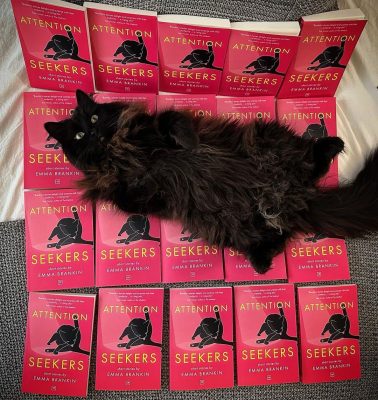
I saw on your Instagram that your cat is a prolific reader. What’s her favourite book?
Sabre is a boy – the fabulously effeminate fluff often deceives people! Sabre mainly choses books based on which one scratches up against his chin best so he likes a sturdy book. But needless to stay, he loves Attention Seekers, which features his likeness on the cover and is dedicated to him.
Your opening lines immediately draw the reader right into the atmosphere of the scene. Could you share with us your secret for strong beginnings?
Ooh, thank you for the lovely compliment. I feel that once I’ve got the opening line, the story flows a lot better. I would say I like an opening line to put the reader bang in the middle of the action, to pose some version of the core dilemma that’s going to propel the action forward and, also, one that makes the reader go ‘well, I have to find out what’s going on here’. George Saunders says all we’re doing with each sentence is asking a reader to trust us enough to read the next sentence. I think about that a lot, especially when crafting an opening.
You can purchase “Attention Seekers” here.




